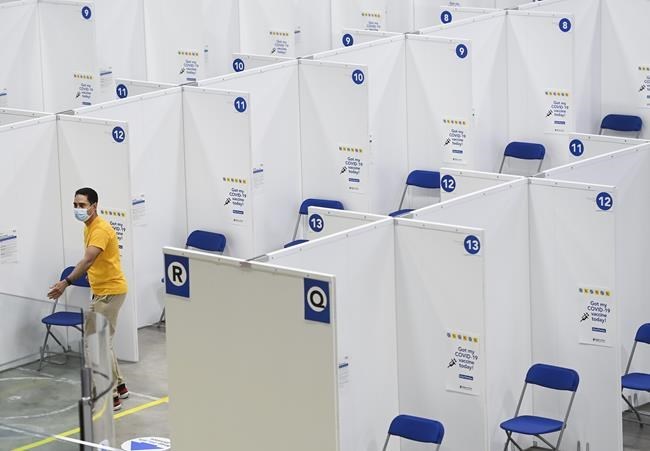Some leaders are mulling incentives to get COVID-19 vaccine into the arms of hard-to-reach populations as infection rates slowly decline in most of the country as more people are inoculated.
"We all want to get back to some sense of normal, and the path forward to do that is to get Manitobans vaccinated as soon as possible," Premier Brian Pallister said Thursday.
He announced grants of up to $20,000 each to community, religious, sports and arts organizations in areas where vaccine uptake has been low. The money can be spent on anything from outreach programs to prizes such as tickets to a sporting event. Pallister also left the door open to providing incentives directly to people.
About two-thirds of eligible Manitobans have received at least one dose of vaccine, but areas lagging behind include core neighbourhoods in Winnipeg and some rural areas south of the capital.
Pallister said there's no easy answer, but low rates can be linked to mobility issues, language barriers and cultural or religious concerns
In recent weeks, Manitoba has faced a significant surge of COVID-19 infections, which has put serious pressure on health care system overwhelmed intensive care capacity.
The province reported 360 new COVID-19 cases and five deaths.
Quebec Premier François Legault said Thursday that his Coalition Avenir Québec government was also looking at incentives to get more people vaccinated.
"Some people are scared — with no reason — about the vaccine, so we have to explain to them why they need to be vaccinated," Legault said.
About 70 per cent of Quebecers over the age of 12 have received at least one dose. But vaccinations rates are slower in two of the cities most affected by the pandemic — Montreal and its northern suburb Laval.
In Montréal-Nord, one of the city’s lowest-income boroughs, the vaccination rate is almost 44 per cent and the health region has the second-highest infection rate in Quebec.
The province reported 267 new infections and six more deaths from COVID-19.
Nationally, all key indicators — including new cases, hospitalizations and deaths — are trending down as vaccination supply increases. As of Wednesday, more than 24.5 million doses had been administered across the country
"The more people who get fully vaccinated, the sooner and safer it will be to ease restrictions and then individual precautions, allowing us to get back to the interactions and activities that we miss so much," Canada's chief public health officer, Dr. Theresa Tam, said in a statement.
Ontario officials warned that while the COVID-19 outlook is growing more positive, people must remain vigilant because of the increasing prevalence of a variant first detected in India. The variant is responsible for nearly one-quarter of Ontario's infections.
Health Minister Christine Elliott said the province's vaccine team is considering whether to allow people to book their second doses sooner than the current four-month interval.
"We're looking at all options, because we need to stay ahead of this variant," she said.
Ontario's third wave has been receding in recent weeks and the province has marked its declining infections by rolling back emergency hospital measures and mulling whether to reopen sooner than scheduled.
There were 870 new cases and 10 more deaths linked to the virus.
Health officials there also announced anyone who received a first dose of the Oxford-AstraZeneca vaccine will be able to get Pfizer-BioNTech or Moderna as a booster starting Friday.
The decision follows guidance earlier this week from the National Advisory Committee on Immunization. Quebec started mixing second doses in April and Manitoba followed earlier this month.
British Columbia, Quebec and Nova Scotia also announced second doses would be moved ahead. B.C. as well released a plan to mix or match, even for those who didn't receive AstraZeneca first.
Provincial health officer Dr. Bonnie Henry said the province continues to have issues maintaining a steady supply of the Moderna vaccine, meaning some who received it as a first dose may get Pfizer as their booster.
B.C. reported 199 new cases and two more deaths.
This report by The Canadian Press was first published June 3, 2021.
Kelly Geraldine Malone, The Canadian Press



